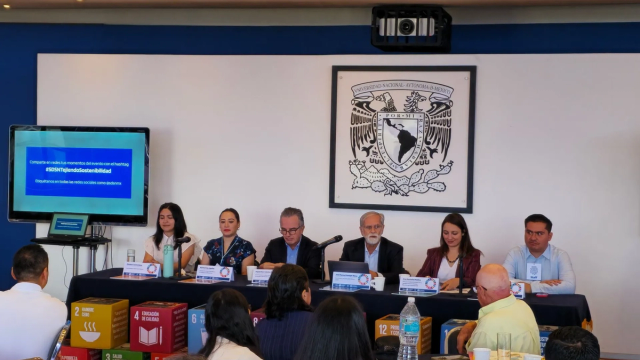Alongside 95 Universities, SDSN Mexico Proposes a Strategy to Achieve the SDGs
SDSN Mexico held its in-person members meeting “Weaving Actions for Sustainability” on June 19-20, to contribute to the national efforts to make progress on the SDGs and the 2030 Agenda.
During his welcome remarks, the co-Chair of the network on behalf of UNAM, José Manuel Saniger Blesa, stated his interest in establishing a joint strategy among the more than 90 university members, in order to accelerate and achieve community actions in favor of the 17 SDGs. Additionally, Dr. Saniger mentioned the Network’s interest in establishing working groups and workshops to showcase local proposals that can be scaled up and result in tangible achievements.
The Co-Chair on behalf of Tecnológico de Monterrey, Miguel Ruiz Cabañas Izquierdo, also mentioned the network’s intention of organizing thematic seminars and conferences as spaces where Mexico’s vision on sustainable development could be analyzed in the coming years.
As part of the annual members’ meeting, both Network Managers presented the University Decalogue for Sustainability, a three-year process document that compiles proposals presented by SDSN Mexico’s members during this period of time. Karina Ruiz (Tec de Monterrey) and Edgar Leyva (UNAM) explained that the search for sustainability is achieved through a development model that is socially inclusive, environmentally responsible, and economically committed to the generation of wealth that contributes to social welfare and the reduction of inequalities.
University Decalogue for Sustainability
The implementation of the SDGs and the 2030 Agenda requires greater commitment from society as a whole, by establishing solid and transformative foundations to achieve sustainable development in the short, medium, and long term.
To achieve this, Higher Education Institutions (HEIs) must become leaders by ensuring their institutional governance, practices, and culture include sustainable actions. Therefore, the HEIs that are part of SDSN Mexico must pledge to work in a coordinated manner, to achieve sustainable development through a decalogue consisting of the following pillars: Internal Commitment; Education; Research and Innovation; Community Outreach; Culture; University Management; Transparency; Financing; Partnerships; and Communication.
- Internal Commitment: Undertake the urgent need to generate strategies and tools to prioritize the SDGs and their associated targets within institutions, at all organizational levels.
- Education: Implement curricula and opportunities for the development of youth capabilities that strengthen empathy, sustainability, ethics, inclusion, critical thinking, leadership, and the guidance needed to create partnerships.
- Research and Innovation: Develop transformative science, technology, and innovation initiatives that address municipal, state, and national level challenges; in which the academic community is a part of collaborative governance strategies and provides evidence for decision-making impacting public policies.
- Community Outreach: Establish knowledge dialogues with diverse communities for the development of projects that favor the social appropriation of knowledge, and territorial development, and provide solutions that connect with their reality.
- Culture: Build a cultural agenda that serves as a blueprint for confronting humanity’s challenges, and forms the vision of a common future that contributes to making our university community more resilient, inclusive, and sustainable.
- University Management: Implement programs that ensure college campuses are environmentally sustainable and socially inclusive.
- Transparency: Implement democratic, accountable, and transparent mechanisms for processes, scenarios, and decision-making within our institutions as well as in the community.
- Financing: Develop and promote mechanisms for identifying financing sources that can support feasible solutions to the most urgent challenges to be solved both locally and globally.
- Partnerships: Promote the creation of partnerships internally and externally, with other university communities, companies, governments, civil society groups, Indigenous communities, and others, by leveraging our institutional capacity-building and infrastructure.
- Communication: Utilizing public forums and platforms, communicate on the progress of the implementation of the SDGs and the 2030 Agenda at our universities.
This decalogue avoids suggesting actions to be fulfilled in the distant future. Instead, it suggests actions that can be implemented immediately and that, as a whole, are the premise for rethinking university communities. Whoever adopts the decalogue can build on these 10 points and adapt them according to their local contexts. The simplicity of each point is meant to facilitate implementation.
The ten proposals constitute a roadmap that allows for more connected, strong, and egalitarian university communities that are willing to solve problems in their immediate (and not so immediate) environments through an informed vision of the groups and places involved.
Finally, this decalogue encourages solutions guided not only by analysis and data, but also by creativity, empathy, and solidarity; in particular, solutions that reflect the importance of HEIs and their contributions to the global development agenda. HEIs are creators of knowledge, data, and above all, talented leaders committed to their communities and future generations.
To learn more about SDSN Mexico, visit the website or email [email protected].
